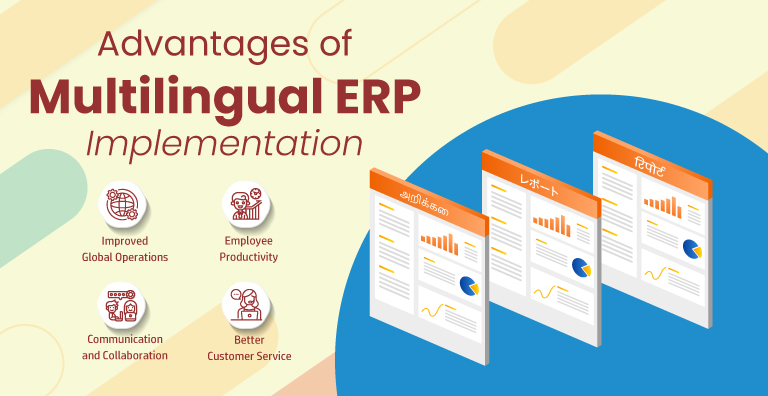When leveraged appropriately, languages can unlock opportunities across various markets. However, if not, they can serve as barriers, impeding communication and making it even more challenging for businesses to operate.
ERP software applications, given their business coverage and the extent to which companies depend on them, aren’t an exception to linguistic challenges. Companies operating across multiple geographies and using a centralized Multilingual ERP software should have a multilingual one to cover the various business centers they operate.
However, how does multilingual ERP software help organizations? It does so in various ways. Let’s explore them in this blog.
7 Advantages of Multilingual ERP Implementation
Here’s why multilingual ERP software support is essential for businesses, amidst the age of globalization and in which languages have taken center stage.
1. Improved Global Operations
Often, companies operating across multiple global locations struggle with standardization. However, a multilingual ERP provides a unified approach to business operations while enabling its use in the user’s local language. It simplifies managing operations for companies across different locations and maintaining global standards. Furthermore, every branch or overseas office of the company can have real-time access to data in their language, ensuring more uniform, quicker, and more informed decision-making at the global level.
2. Enhanced Communication and Collaboration
Multilingual ERP software enables departments or subsidiaries across different countries to communicate more effectively. It enables employees to access the system in their local language, helping reduce miscommunication and understand messages, reports, etc., better. These platforms serve as a unified system wherein users from different linguistic and cultural backgrounds work in unison, ensuring productive collaboration.
For example, a manufacturing industry can implement multi-language ERP software across various countries, including India, Japan, Spain, Malaysia, etc., and provide local language support to help users communicate through the system and collaborate for various purposes, including discussing reports, recommendations, etc.
3. Increased Employee Productivity
Multilingual ERP software services can also help boost productivity by allowing employees to work on the ERP in their native language. It helps reduce the cognitive load of translating information or instructions and enables quicker task completion with better accuracy. Additionally, a multiple-language ERP system can provide user guides, training instructions, manuals, etc., in the local language, enabling better learning and more system use.
4. Better Customer Service
Often, customers struggle to deal with a company due to language issues. So, in these cases, services aren’t a problem but language is. Implementing a multilingual ERP can help support multiple languages, enabling customer-facing professionals to interact with customers in their preferred language. The result is a much better service, increased customer satisfaction, and a personalized customer experience.
5. Cost Savings
Imagine designing, implementing, and operating a separate ERP system for every country! Not only will it cost a company millions of dollars but also cause potential data silos and result in operational inefficiency.
Thus, instead of implementing different systems to serve a geography’s linguistic needs, companies must consider implementing a single ERP system with multilingual capabilities. It can help bring every business center on the same page, simplify management, reduce costs, and make it easier for administrators to manage support, upgrades, and maintenance.
6. Increased Cultural Adaptation
One of the most frustrating things for an employee or user is using a software application they don’t understand! It can grow dissatisfaction among employees and affect the company’s overall productivity. However, by providing a multilingual ERP system, companies can make employees feel more valued and respected, enhancing workplace morale. Besides, enabling employees to interact with the application in their language can benefit retention.
7. Higher Scalability
A multilingual ERP system can also ease a company’s endeavors to expand to more linguistically diverse regions. At least on the language front, the system can scale easily to accommodate more languages without demanding extensive reconfiguration. It can help simplify entering new markets while ensuring the system grows and evolves with the business’s needs.
Looking for Multilingual ERP Software Services? Choose LinguaSol!
LinguaSol is a premier translation solution and service provider with a global clientele and expertise in over 200 languages worldwide. Our ERP translation support covers translation and localization, translation for various report types, and terminology and glossary development. Our experts ensure accurate translations across various fronts, including language, context, and culture.
Do you want to know more and explore our expertise? Please email us at sales@linguasol.net and connect with our experts.
Ref. No- LSB10241050

